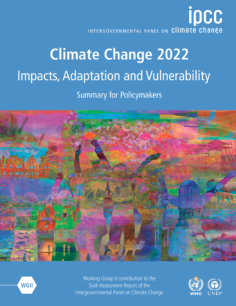Climate change 2022: impacts, adaptation, and vulnerability

This Summary for Policymakers (SPM) presents key findings of the Working Group II (WGII) contribution to the Sixth Assessment Report (AR6) of the IPCC. The report builds on the WGII contribution to the Fifth Assessment Report (AR5) of the IPCC, three Special Reports, and the Working Group I (WGI) contribution to the AR6 cycle.
This report recognizes the interdependence of climate, ecosystems and biodiversity, and human societies (Figure SPM.1) and integrates knowledge more strongly across the natural, ecological, social and economic sciences than earlier IPCC assessments. The assessment of climate change impacts and risks as well as adaptation is set against concurrently unfolding non-climatic global trends e.g., biodiversity loss, overall unsustainable consumption of natural resources, land and ecosystem degradation, rapid urbanisation, and human demographic shifts, social and economic inequalities and a pandemic.
The scientific evidence for each key finding is found in the 18 chapters of the underlying report and in the 7 cross-chapter papers as well as the integrated synthesis presented in the Technical Summary (hereafter TS) and referred to in curly brackets {}. Based on scientific understanding, key findings can be formulated as statements of fact or associated with an assessed level of confidence using the IPCC calibrated language. The WGII Global to Regional Atlas (Annex I) facilitates the exploration of key synthesis findings across the WGII regions.